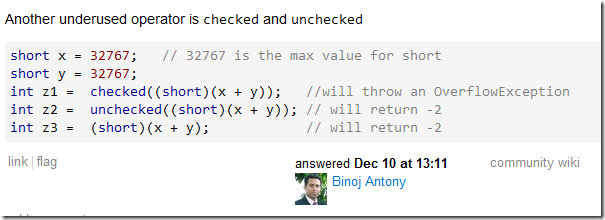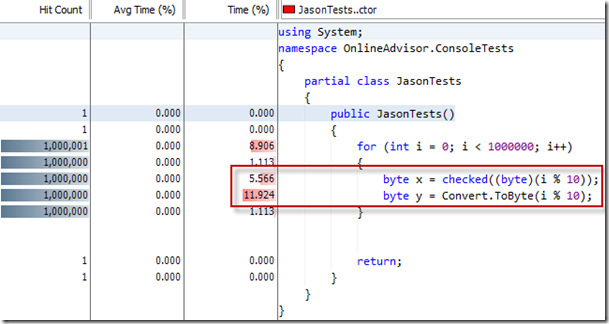I’ve been programming against the .net framework since the late beta of version 1.0 came out. (I had a couple year hiatus when I took a job doing some Linux & C++) however, suffice it to say, I’ve been using the language a long time. I still find it amazing that there are features in the language that have been a round a long time and still manage stumbling across things I’ve never seen before.
Today’s newly learned feature I saw in a blog by bogardj over at LostTechies where he wrote up a little Expressions Cheat Sheet.
In his blog, I notice the “checked” keyword had the blue syntax highlighting. (which usually means it’s a C# keyword)
So, to verify, I copied the word into my C# editor and what do you know… It is a C# keyword. This is probably something most if not all C# programmers out there already know and I, for some reason have missed this.
Here’s a blurb about it on the stack overflow “Hidden features of C#”.
And of course you can get the official details @ http://msdn.microsoft.com/en-us/library/74b4xzyw(VS.71).aspx
I decided to explore this a little. As an academic exercise I wanted to see what the difference would be between using the checked keyword with a cast operation and compare that to the System.Convert.ToByte operation. 
Will generate the following error. System.OverflowException : Arithmetic operation resulted in an overflow.

While using the System.Convert class will generate a different error. System.OverflowException : Value was either too large or too small for an unsigned byte.
And last experiment I threw both of the conversion attempts in a loop and fired up the ANTS Profiler which shows that using the built in checked keyword with a cast operation is faster than using the BCL conversion.
As to which one is better I would probably have to dig deeper into other side affects that one may have over the other… Up front I don’t see any issue with the cast and checked keyword combo.

